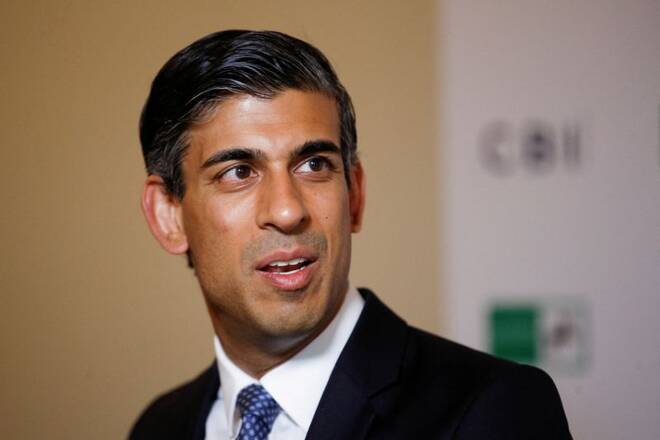Advertisement
Advertisement
British power firms’ shares slide after windfall tax report
By:
(Reuters) - Britain's finance minister Rishi Sunak has ordered officials to draw up plans for a possible windfall tax on more than 10 billion pounds ($12.58 billion) of excess profits by electricity generators, including wind farm operators, the Financial Times reported on Monday.
By Siddarth S
(Reuters) -Shares of British power generating firms plunged on Tuesday after a news report that Britain had ordered plans be drawn up for a possible windfall tax on more than 10 billion pounds ($12.6 billion) of excess profits made by the companies.
British Finance Minister Rishi Sunak is seeking to raise cash to support households facing higher energy bills, the reported on Monday. Asked for comment, the Treasury did not provide a specific response to the article.
Shares of British power generators — Drax, Centrica and SSE — were down between 11% and 19%. They are on track for their worst day since the start of the pandemic and were the worst performers on the STOXX Europe 600.
A Drax spokesperson pointed to the company’s 5 billion pound investment programme featuring major infrastructure projects that would help create jobs and support the country’s energy security, but did not comment specifically on the potential tax.
SSE declined to comment, while Centrica did not respond to Reuters requests.
Sunak and British Prime Minister Boris Johnson urgently want to set out measures to address rising energy bills and how to pay for them, the FT reported, citing unidentified officials. An announcement could come this week or in early June, it added.
“So far, the discussions by politicians have been exclusively focused on the oil and gas sector, but we believe the risk of this spilling over into the power sector is also rising,” Citigroup said on Tuesday, downgrading its rating on Drax shares to “sell” from “neutral”.
Sunak has said that if energy companies did not reinvest profits earned from soaring oil and gas prices back into jobs, growth and energy security then no option was off the table when it comes to the possibility of windfall taxes.
He told BBC television this month: “I’m not naturally attracted to the idea of them (windfall taxes) but what I do know is that these companies are making a significant amount of profit at the moment because of these very elevated prices.”
The conflict in Ukraine, combined with a rapid recovery in demand for fuel as the COVID-19 pandemic has waned, helped drive oil and gas prices sky-high in recent months.
($1 = 0.7947 pounds)
(Reporting by Siddarth S and Jahnavi Nidumolu in BengaluruAdditional reporting by Akanksha KhushiEditing by Edmund Blair and Mark Potter)
About the Author
Reuterscontributor
Reuters, the news and media division of Thomson Reuters, is the world’s largest international multimedia news provider reaching more than one billion people every day. Reuters provides trusted business, financial, national, and international news to professionals via Thomson Reuters desktops, the world's media organizations, and directly to consumers at Reuters.com and via Reuters TV. Learn more about Thomson Reuters products:
Did you find this article useful?
Latest news and analysis
Advertisement
